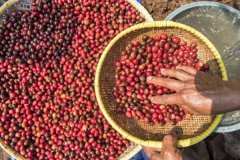The general strike in Brazil affected the global commodity market and a large number of coffee exports were suspended.

Professional coffee knowledge exchange more coffee bean information please follow the coffee workshop (Wechat official account cafe_style)
Brazilian truckers protesting against high oil prices have begun to affect global commodity markets on the eighth day of the strike, blocking agricultural exports, such as soybeans, coffee and sugar, Bloomberg reported. Meat traders were forced to cull poultry because of insufficient feed, and sugar mills temporarily closed factories due to lack of fuel.
Brazil's main exports
Brazil's main export commodities, soybeans are the largest
According to Brazilian shipping company Williams, the number of ships waiting at the port of Santos increased from 10 to 18 between May 21 and May 25 due to delays. According to the port authorities, trucks bound for the port remained at a standstill on 28 days, resulting in a reduction in the volume of goods transported to the export terminal.
Soybeans
Chinese food giant Cofco suspended shipments from Santos, Brazil's largest port, because of a shortage of goods to fill the entire ship, according to people familiar with the matter. A spokesman for the company declined to comment.
Brazil is the world's largest soybean exporter. In the face of trade disputes between China and the United States, China has reduced its purchases of American soybeans and replaced some of its demand with Brazilian soybeans. However, with Brazilian exports blocked, China may be forced to re-import American soybeans.
Other soybean exporters say they have used inventories over the past few weeks to keep exports normal, but inventories are now at very low levels.
At Paranagua, Brazil's second-largest grain delivery port, five ships capable of carrying about 300000 tons of soy flour failed to sail as scheduled in the past seven days because they did not carry enough cargo, Port Authority press officials said on Monday.
Coffee and sugar
Due to a shortage of supply, three ships carrying pulp and sugar were unable to leave the port. Nelson Carvalhaes, president of exporter group CeCafe, told Bloomberg that coffee shipments had to be suspended at most Brazilian ports, while some factories supplying soybean oil, biodiesel and orange juice were also suspended because warehouses were full.
In Brazil, the world's largest sugar industry, most sugar mills have stopped harvesting sugar cane due to lack of fuel, and all factories and sugar cane suppliers in Sao Paulo state will be suspended until May 29, according to industrial group Unica.
Biosev, a subsidiary of Louis Dreyfus, Brazil's second-largest sugar producer, said it had suspended operations at two sugar plants due to a lack of fuel and that other plants would run out of fuel within two days. INTL FCStone said in a report on Monday that sugar production in the south-central region could be reduced by 10.9 million tons in late May as a result of the truck drivers' strike.
Meat
JBS, the world's largest meat company, has stopped slaughtering cattle, pigs and chickens at home because it cannot deliver its products to customers or get enough feed, according to people familiar with the matter.
ABPA, an association of meat producers, said that 64 million chickens had been culled and that 1 billion chickens and 20 million pigs were still at risk due to insufficient feed given to the animals.
Important Notice :
前街咖啡 FrontStreet Coffee has moved to new addredd:
FrontStreet Coffee Address: 315,Donghua East Road,GuangZhou
Tel:020 38364473
- Prev

Indonesian Coffee exporters Association: national coffee production in Indonesia is expected to increase by 10-15% this year.
Professional coffee knowledge exchange more coffee bean information please follow coffee workshop (Wechat official account cafe_style) according to Moelyono Soesilo, chairman of the industrial and professional department of the Central Administration of the Indonesian Coffee exporters Association (AEKI), coffee production this year is expected to increase by 10-15% over last year, bringing the total coffee production to 11 million to 11.5 million bags or about 660000 to 690000 tons.
- Next

The Japan International Coffee Fair will be held in June 2018. Coffee lovers should not miss it!
Professional coffee knowledge exchange more coffee bean information please follow the coffee workshop (Wechat official account cafe_style) do you know that Japan is one of the largest coffee consumers in the world? When you walk in a city like Tokyo, you will understand why. It is said that there are more than 7 million cafe restaurants in this country. Corresponding to this situation, Japan will raise the
Related
- Workers collapse! Lucky suspects that it will introduce freshly cut fruits?!
- 1-point subsidy recipients wear thousand-yuan watches?! Local response: For low-income households
- Can lightly roasted coffee beans be used to extract espresso? How finely should you grind high-quality coffee beans to make Italian latte?
- What is the difference between the world's top rose summer coffee and Yejia Shefi? What are the flavor characteristics of Yega Shefi coffee and Panama rose summer?
- The ceremony is full! Starbucks starts to cut the ribbon at a complimentary coffee station?!
- A whole Michelin meal?! Lucky launches the new "Small Butter Apple Crispy Latte"
- Three tips for adjusting espresso on rainy days! Quickly find the right water temperature, powder, and grinding ratio for espresso!
- How much hot water does it take to brew hanging ear coffee? How does it taste best? Can hot water from the water dispenser be used to make ear drip coffee?
- What grade does Jamaica Blue Mountain No. 1 coffee belong to and how to drink it better? What is the highest grade of Blue Mountain coffee for coffee aristocrats?
- What are the flavor characteristics of the world-famous coffee Blue Mountain No. 1 Golden Mantelin? What are the characteristics of deep-roasted bitter coffee?

